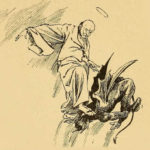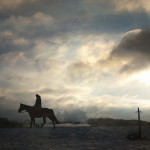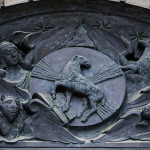We run our website the way we wished the whole internet worked: we provide high quality original content with no ads. We are funded solely by your direct support. Please consider supporting this project.

How Jesus Cursed the Curse
People who have committed to following Jesus are called to mimic even this aspect of Jesus’ life. As much as possible, we are to model what creation will look like when God’s Kingdom is fully come. We are to manifest as much as possible God’s original design for creation not only by how we love one another, but also by how we care for animals and the creation.
There are a number of points in the Gospel where Jesus treats nature in a way that builds on the Old Testament theme of Yahweh “rebuking” hostile waters and various sea monsters that ancient people believed encompassed and threatened the earth (e.g. Ps 18:15; 104:7; 106.9). When Jesus rebukes the storm, he’s playing the role of Yahweh in the Old Testament and exerting his authority over forces of evil that cause seas to behave in chaotic and threatening ways. Something similar is indicated when Jesus at another point calmed the storm and walked on the waters.
Closely related to this is an episode where Jesus cursed a fig tree (Mk 11:12-143; Mt 21:18-19). What makes this cursing particularly interesting is that Mark tells us the reason the fig tree had no figs was because it wasn’t the season for figs. It thus seems like Jesus’ judgment on the tree is completely arbitrary. But once we understand it against the background of the apocalyptic thought of Jesus’ day, we see that this is not the case.
In the apocalyptic worldview, all aspects of nature were believed to be under the guardianship of various angels. Some of these angels had rebelled and were now misusing their God-given authority. Everything from plagues to earthquakes to famines and violent storms were believed by many to be the consequence of fallen powers corrupting nature. Not only this, but barren or infected fig trees in apocalyptic thought were symbols of Satan’s curse, and the fruitfulness of fig trees had become a how creation will be restored when the Messiah comes and frees creation from the curse.
In this light, we should interpret Jesus’ cursing of the fig tree as an act of “cursing the curse.” Jesus is demonstrating that, where and when God reigns, the demonic corruption of nature will be overcome and nature will begin to be restored to the state God originally intended it to be in. He is pointing to a time when the whole cosmos will be delivered from the powers of darkness, when there shall be no more famines or life-threatening storms, and when there shall be no more violence in the animal kingdom or between humans and animals.
Isaiah tells us that, in this day, the wolf will live in peace with the lamb. The lion will walk alongside the calf as a little child leads them. Bears will feed alongside of cows, and lions “will eat straw like the ox” (11: 6-9). Humans will be restored to their rightful place as loving lords of the earth (Gen. 1:26-28).
Photo credit: Rich_Lem via Visualhunt.com / CC BY-NC-SA
Category: General
Tags: Peace, Spiritual Warfare
Related Reading

Podcast: How Does Spiritual Warfare Actually Work?
Greg talks about Spiritual Warfare and the risks of speculating about things we do not know anything about. http://traffic.libsyn.com/askgregboyd/Episode_0331.mp3

Podcast: Isn’t Casting Out Demons an Act of Violence?
Greg considers whether or not casting out demons is violent. http://traffic.libsyn.com/askgregboyd/Episode_0441.mp3

Podcast: Did Jesus Really Engage in Spiritual Warfare, or Was He Simply Playing Along with the Cultural Narratives of His Time?
Greg considers whether Jesus genuinely engaged in spiritual warfare, or if he was simply playing along with the beliefs of those around him. http://traffic.libsyn.com/askgregboyd/Episode_0289.mp3

Angels and Spirits in a Secular World
This week, we’ve been thinking about why we should believe in a spiritual realm in a world shaped by secular thought. One argument that supports the belief that spirits are real is the oldest, most venerable, and most popular argument for this belief in the western intellectual tradition. In essence the argument runs as follows:…

Jesus Came to Bring a Sword?
Jesus said: “Do not suppose that I have come to bring peace to the earth. I did not come to bring peace, but a sword” (Mt 10:34). Some, both modern scholars along with church leaders since the fourth century, have used this passage as evidence to argue that Jesus is not altogether non-violent. When we…

The Final Battle in Revelation
I will conclude this series on the violent imagery in Revelation by addressing the infamous eschatological battle scene found in 19:11-21, for it is this graphically violent section of Revelation that is most frequently appealed to by those who argue against the claim that Jesus reveals an enemy-loving, non-violent God that is unconditionally opposed to…
